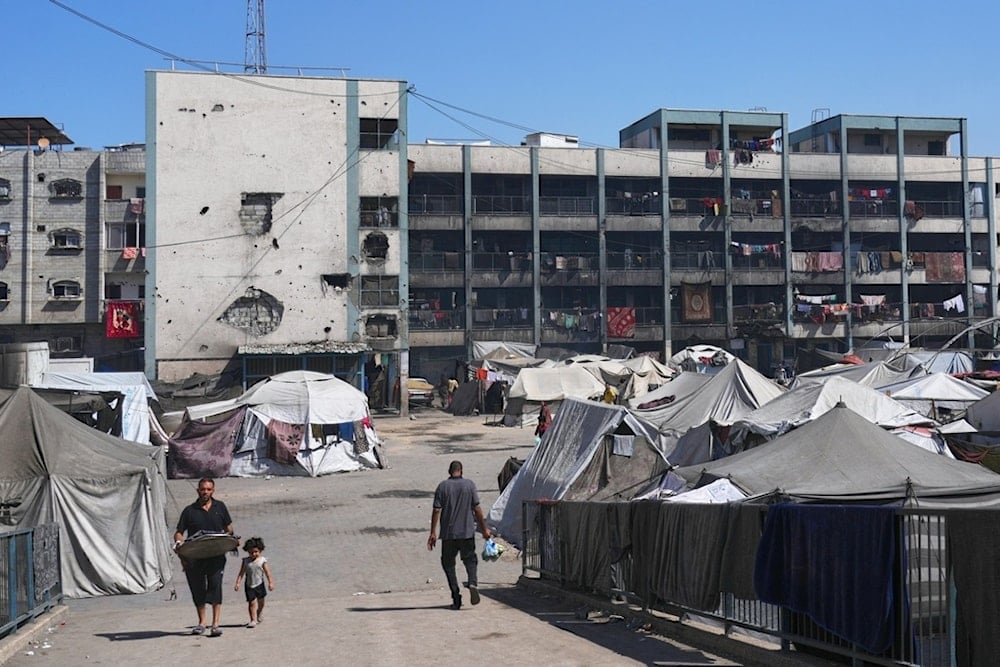UN warns of 'lost generation' amid Gaza education crisis
UNICEF warns of a "lost generation" as Gaza's education system collapses after years of war, with 85% of schools destroyed or unusable.
-

Tents are seen at UN school used as a shelter for displaced Palestinians in Khan Younis, Tuesday, September 30, 2025 (AP Photo/Jehad Alshrafi)
With Gaza’s education system devastated by nearly two years of relentless Israeli aggressions, UNICEF's regional director has warned of a looming "lost generation" of Palestinian children left with no access to formal education.
“This is the third year that there has been no school,” Edouard Beigbeder, UNICEF’s regional director for the Middle East and North Africa, told AFP in Al-Quds on Thursday after returning from the Gaza Strip.
“If we don't start a real transition for all children in February, we will enter a fourth year. And then we can talk about a lost generation.” Beigbeder added.
The war between the Palestinian Resistance and the Israeli occupation has left much of Gaza in ruins, displacing the vast majority of the population, many more than once, and crippling public services, particularly education.
“The destruction is almost omnipresent wherever you go,” Beigbeder told AFP. “It is impossible to imagine 80 percent of a territory that is completely flattened out or destroyed.”
Read more: 300,000 Gaza students resume classes amid aid blockade
Makeshift learning offers little relief
A US-brokered ceasefire in early October has allowed UNICEF and its partners to reach a fraction of children through temporary “learning centres.”
According to Beigbeder, only about one-sixth of school-aged children are attending these makeshift classes.
Children in these centres receive just three days of basic instruction in reading, writing, and mathematics, far from a comprehensive education. The facilities themselves are improvised: metal structures covered with plastic sheeting, or tents set up near displacement camps.
Chairs are rare, and children often sit on mats or carpets, using salvaged slates, plastic boards, or wooden planks as writing surfaces. “I've never seen everyone sitting properly,” Beigbeder told AFP.
Read more: US-backed GHF in talks over future role in postwar Gaza: FT
Obstacles to rebuilding education infrastructure
Despite the pause in fighting, Beigbeder said the state of Gaza’s education system remains “catastrophic,” with 85 percent of schools destroyed or unusable.
Many buildings still standing are being used as shelters for displaced families, while others are located in zones now inaccessible due to the presence of Israeli forces.
Gaza’s education sector was already overstretched before the war, with half of the pre-war population under the age of 18. Of the 300 schools administered by the Palestinian Authority, around 80 are in need of renovation, 142 have been completely destroyed, and 38 are now inaccessible.
UNICEF has emphasized the urgent need to get construction materials and school supplies into Gaza to establish semi-permanent learning facilities. However, these supplies, including notebooks and blackboards, have been blocked by the occupation under claims they are “non-essential.”
“How can you rehabilitate classrooms if you don't have cement?” Beigbeder asked AFP. “And above all, we need notebooks and books ... blackboards, the bare minimum.”
"Food is survival. Education is hope," he added.
Read more: Gaza orphans: Wounded, alone, and trapped in a humanitarian crisis
The World Health Organization stated Thursday that despite the ceasefire, there has been no meaningful improvement in aid access to Gaza, and no visible reduction in hunger levels.
UNRWA and e-learning initiatives
On October 18, the United Nations Relief and Works Agency for Palestine Refugees (UNRWA) launched a new e-learning school year targeting 290,000 students.
However, the effort has faced political challenges. On Friday, US Secretary of State Marco Rubio accused UNRWA of being a “subsidiary of Hamas,” declaring it would not be involved in post-war Gaza, a claim that further complicates humanitarian and educational relief efforts.
Since "Israel's" aggression on Gaza began, civilian infrastructure, including schools, have been systematically targeted by the Israeli occupation forces, pushing an entire generation toward the brink of educational collapse.

 4 Min Read
4 Min Read









